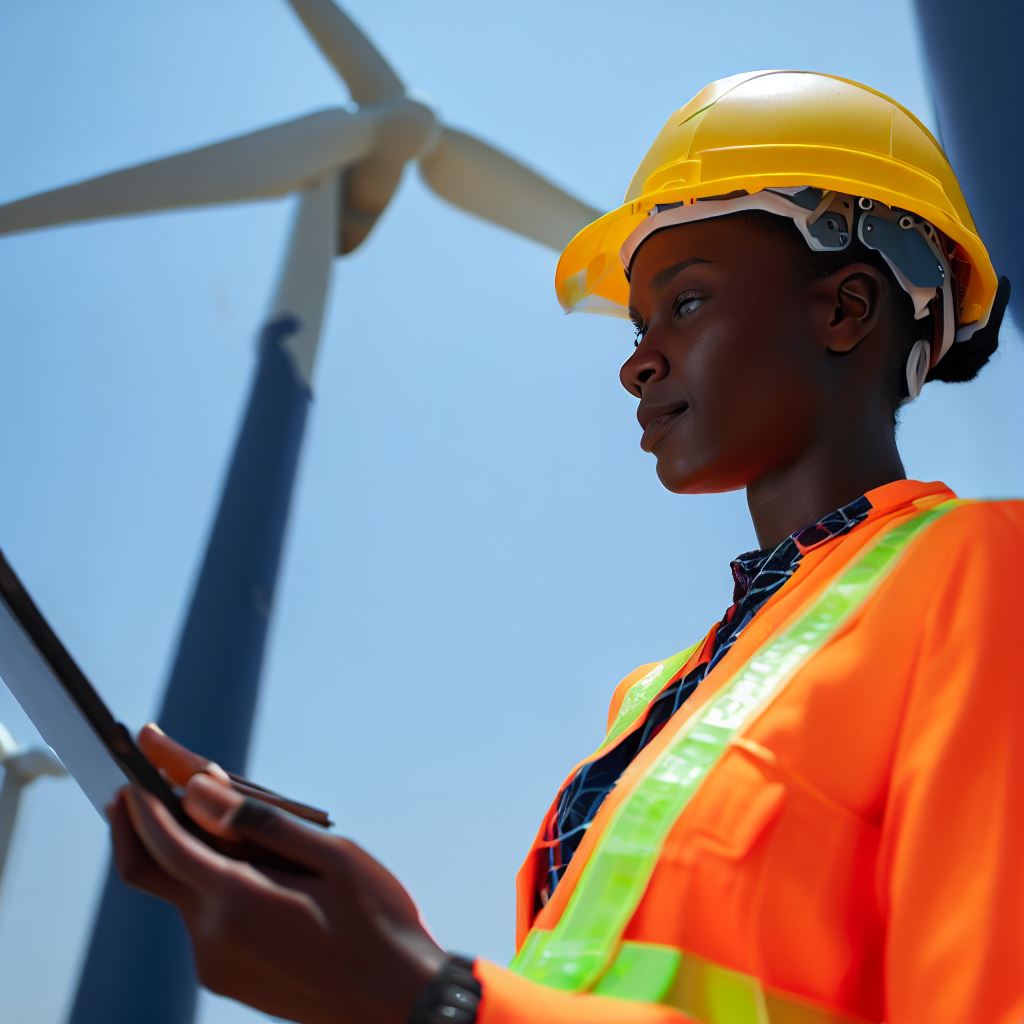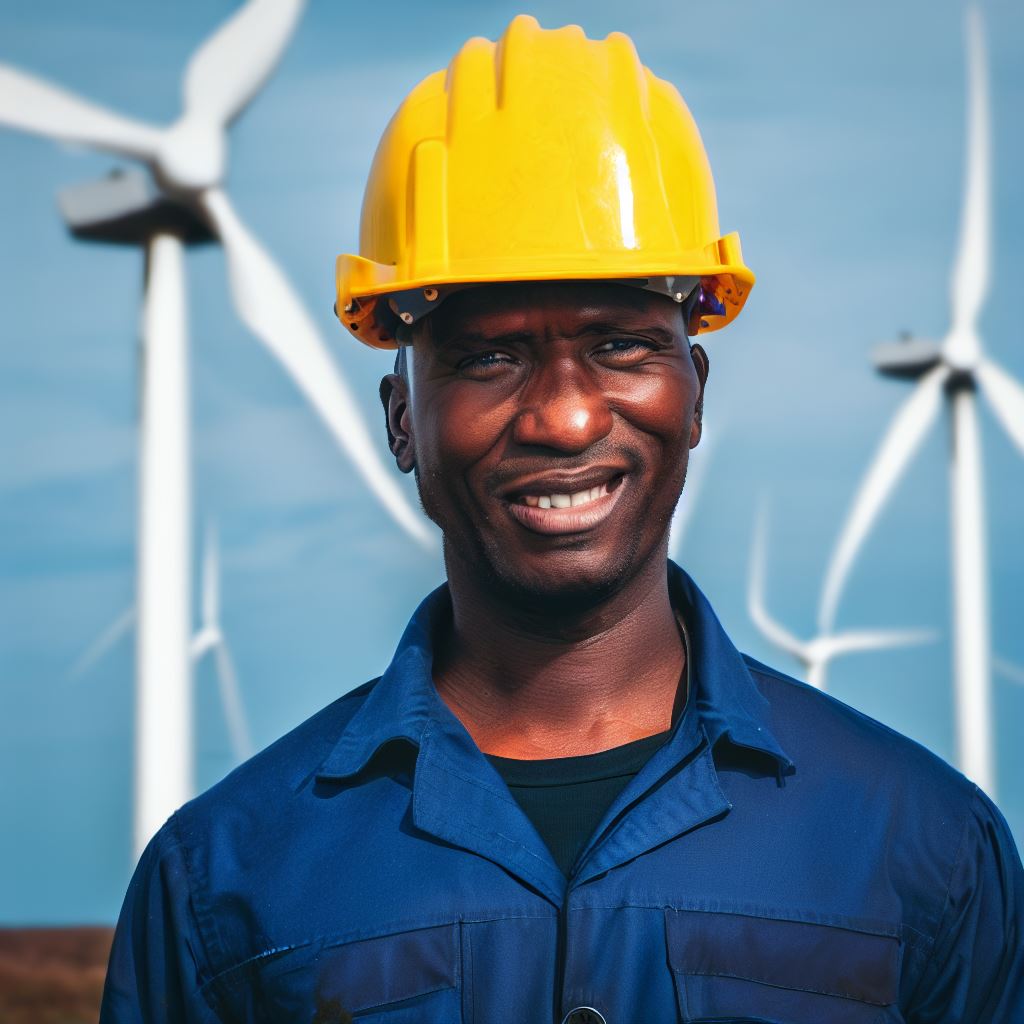Introduction
Nigeria’s wind energy sector has experienced significant growth in recent years.
Wind energy is crucial for sustainable development in Nigeria.
There are various opportunities available for technicians in the field of wind energy.
Current State of Wind Energy in Nigeria
A. Overview of Nigeria’s renewable energy initiatives
- Nigeria has recognized the importance of renewable energy in its pursuit of sustainable development.
- The government has implemented various policies and initiatives to promote the use of renewable energy sources.
- These initiatives aim to diversify the energy mix, reduce dependency on fossil fuels, and mitigate climate change impacts.
- Nigeria’s renewable energy initiatives encompass various sources, including solar, hydro, biomass, and wind energy.
B. Progress made in wind energy sector
- In recent years, Nigeria has witnessed significant progress in the development of its wind energy sector.
- The country has substantial wind resources, particularly in the coastal regions and northern areas.
- This has spurred investments and the installation of wind farms across the country.
- The Nigerian government, in collaboration with private investors, has taken key steps to harness wind energy potential.
- The establishment of favorable policies, such as feed-in tariffs and tax incentives, has attracted investments in wind energy projects.
- Wind energy installations in Nigeria have increased, contributing to the country’s renewable energy capacity.
C. Key wind energy projects and installations in Nigeria
- The Lekki Wind Power Project, located in Lagos State, is one of the significant wind energy projects in Nigeria.
- With a proposed capacity of 150 megawatts, it aims to provide clean energy to approximately one million households.
- The project is expected to be operational by 2023, boosting Nigeria’s renewable energy capacity.
- The Katsina Wind Power Project, located in Katsina State, is another notable wind energy installation.
- This project has a capacity of 10 megawatts and is connected to the national grid, providing electricity to nearby communities.
- The agreement between Nigeria and Denmark for the installation of a 48-megawatt wind farm in Katsina also showcases progress in the sector.
- Other wind energy projects, such as the 135-megawatt Gurara II Wind Power Project and the 100-megawatt Qua Iboe Power Plant, are under development.
- These projects demonstrate Nigeria’s commitment to achieving its renewable energy targets and exploiting wind resources.
In general, Nigeria’s wind energy sector is experiencing significant growth and investment.
The government’s renewable energy initiatives have created opportunities for technicians in the country.
With the establishment of wind farms and the development of key projects, technicians are needed to ensure the efficient operation and maintenance of wind turbines.
As the sector continues to expand, the demand for skilled technicians will increase.
This presents a promising opportunity for individuals interested in the renewable energy sector to contribute to Nigeria’s energy transition and sustainable development goals.
Read: Eco-Friendly Bus Travel: A New Trend in Nigeria?
Factors Driving Nigeria’s Wind Energy Boom
A. Abundance of wind resources in Nigeria
- Nigeria is blessed with a vast potential for wind energy production.
- The northern regions of the country, in particular, have strong and consistent wind patterns.
- These favorable wind conditions make Nigeria an ideal location for harnessing wind power.
B. Government policies and incentives promoting renewable energy
- The Nigerian government has implemented policies to encourage the development of renewable energy sources.
- These include tax incentives, grants, and feed-in tariffs for wind energy projects.
- Such government support has attracted both local and foreign investors to the wind energy sector.
C. Rising energy demands and need for diversification
- Nigeria is experiencing a rapid increase in energy demands due to its growing population and expanding economy.
- As a result, there is a pressing need to diversify the country’s energy sources and reduce dependence on fossil fuels.
- Wind energy offers a clean and sustainable solution to meet Nigeria’s rising energy demands.
D. International investments and collaborations supporting wind energy growth
- International organizations and investors have recognized the potential of Nigeria’s wind energy sector.
- They have provided financial assistance, technology transfer, and expertise to support the growth of wind power in Nigeria.
- Collaborations between Nigerian and foreign companies have also led to the successful implementation of wind energy projects.
In fact, several factors are driving Nigeria’s wind energy boom.
The abundance of wind resources, government policies and incentives, rising energy demands, and international support have all played a significant role in promoting the growth of wind power in the country.
With the ongoing development of wind energy projects, Nigeria is well-positioned to harness its wind potential and diversify its energy sources, contributing to a more sustainable and environmentally-friendly future.
Read: Rural to Urban Transit: Opportunities in Nigerian Buses
Opportunities for Technicians in Nigeria’s Wind Energy Sector
A. Increasing demand for skilled technicians and workforce
- The wind energy sector in Nigeria is experiencing a significant boom, resulting in an increased demand for skilled technicians.
- As the country strives to diversify its energy sources and reduce dependence on fossil fuels, the need for technicians in wind energy is on the rise.
- Technicians play a crucial role in the installation, maintenance, and repair of wind turbines, ensuring their optimal performance.
B. Job prospects, career growth, and salary potential in wind energy industry
- With the growing number of wind farms and projects in Nigeria, there are abundant job prospects for technicians.
- Technicians can expect steady career growth opportunities as the industry continues to expand and mature.
- Furthermore, the wind energy sector offers competitive salaries, making it an attractive career path for skilled technicians.
C. Required qualifications, certifications, and skills for technicians
- To excel in the wind energy industry, technicians must possess the necessary qualifications and certifications.
- A background in electrical or mechanical engineering is typically required, along with technical training in renewable energy systems.
- Proficiency in troubleshooting and problem-solving is essential, as technicians often encounter technical issues with wind turbines.
- Additionally, a strong understanding of safety protocols and the ability to work at heights are crucial for technicians in this field.
D. Training and educational programs available in Nigeria for technicians
- In response to the increased demand for skilled technicians, various training and educational programs are now available in Nigeria.
- These programs offer specialized courses in wind energy technology and provide hands-on training opportunities.
- Institutions such as universities, technical colleges, and vocational centers offer certificates and diplomas in renewable energy disciplines.
- These programs equip technicians with the necessary knowledge and skills to excel in the wind energy sector.
In essence, being a technician in Nigeria’s wind energy sector presents numerous opportunities for career advancement and personal growth.
With the industry’s expansion, the demand for skilled technicians is steadily increasing.
By acquiring the required qualifications and certifications, technicians can thrive in this dynamic field.
With competitive salaries and the potential for career growth, the wind energy industry offers a promising future for technicians in Nigeria.
Read: The Influence of Social Media on Event Planning in Nigeria

Challenges and Solutions in Nigeria’s Wind Energy Sector
A. Infrastructure Limitations and Grid Integration Challenges
- Inadequate transmission and distribution infrastructure hinder the development and integration of wind energy projects.
- Limited grid capacity and stability pose challenges in efficiently integrating intermittent wind power into the existing power system.
- Insufficient energy storage facilities make it challenging to handle fluctuations in wind power generation.
- To address these challenges, investments are needed to improve grid infrastructure and develop modern grid integration technologies.
- The government should focus on strengthening transmission and distribution networks to support the growth of wind energy.
B. Financing and Funding Hurdles for Wind Energy Projects
- High upfront capital costs and long payback periods discourage private investments in wind energy projects.
- Limited access to affordable financing options for both project developers and end-users hinders the sector’s growth.
- Lack of financial incentives, such as tax breaks and grants, creates further barriers for wind energy investments.
- To overcome these hurdles, the government should provide favorable policies, incentives, and financial support to attract investments.
- Encouraging public-private partnerships and establishing renewable energy funds can help secure funding for wind energy projects.
C. Lack of Technical Expertise and Skilled Workforce
- The shortage of skilled technicians and engineers specialized in wind energy hampers the sector’s growth.
- Insufficient training and educational programs focused on wind power technology contribute to the lack of expertise.
- Collaboration between academic institutions, industry stakeholders, and international partners can bridge the skill gap.
- Establishing training centers and vocational programs specifically for wind energy can help develop a skilled workforce.
- Encouraging research and development in wind energy technology can also contribute to building local expertise.
D. Strategies and Solutions to Overcome These Challenges
- The government should create a conducive policy environment that attracts investments and promotes the growth of renewable energy.
- Implementing feed-in tariff programs and power purchase agreements can provide long-term revenue certainty for project developers.
- Strengthening regulatory frameworks to ensure grid access and fair compensation for wind power producers is essential.
- Developing partnerships with international organizations and technology providers can facilitate technology transfer and knowledge exchange.
- Encouraging local content development by providing support to domestic manufacturing and supply chain development is crucial.
In short, Nigeria’s wind energy sector faces various challenges related to infrastructure limitations, financing hurdles, lack of technical expertise, and skilled workforce.
However, with the implementation of effective solutions such as improving grid infrastructure, attracting investments, and developing local expertise, Nigeria can overcome these challenges and unlock the full potential of its wind energy resources.
Read: Networking Tips for Event Coordinators in Nigeria
Success Stories of Nigerian Wind Energy Technicians
A. Profiles of Successful Technicians in the Industry
- Adeola Hassan: With years of experience, Adeola has become a renowned wind energy technician, overseeing multiple successful projects.
- Ibrahim Sani: Ibrahim’s expertise in troubleshooting and maintenance has made him a valuable asset to wind energy companies.
- Fatima Ahmed: Fatima’s exceptional skills in wind turbine installation have earned her recognition as one of Nigeria’s top technicians.
B. Achievements and Contributions of Nigerian Technicians to Wind Energy
- Nigerian technicians have played a pivotal role in the development of wind energy projects across the country.
- They have successfully installed and maintained wind turbines, ensuring optimal performance and reducing downtime.
- Nigerian technicians have contributed to the overall growth of the renewable energy sector in Nigeria.
- By providing a skilled workforce, they have attracted foreign investors to invest in wind energy projects.
C. Inspiring Stories of Career Progression and Impact
- Ibrahim Sani started his career as a junior technician and worked diligently to acquire advanced skills in wind turbine maintenance.
- Through continuous learning and dedication, Adeola Hassan went from being a trainee to managing complex wind energy projects.
- Fatima Ahmed’s passion for renewable energy motivated her to start her own wind energy consultancy, empowering local communities.
- These success stories serve as motivation for aspiring wind energy technicians, showcasing the potential for growth and impact in the industry.
- Nigerian technicians have uplifted their communities by creating job opportunities and contributing to sustainable energy solutions.
- The achievements of these technicians have not only benefited the industry but also Nigeria’s sustainable development goals.
Overall, Nigerian wind energy technicians have proven their expertise, making significant contributions to the sector’s growth.
Their success stories inspire many others and showcase the immense opportunities available in this booming industry.
Find Out More: Nigeria’s Transit System: A Guide to Bus Fare Structures
Recommendations for Aspiring Wind Energy Technicians
A. Steps to enter the wind energy field
- Research and understand the basics of wind energy and its role in Nigeria’s renewable energy sector.
- Acquire the necessary education and training in relevant fields such as electrical or mechanical engineering.
- Seek opportunities for internships or apprenticeships in wind energy companies to gain hands-on experience.
- Stay updated with the latest technological advancements in wind energy through industry-related publications and websites.
- Join industry-specific associations or organizations to network with professionals and stay informed about job openings.
B. Guidance for obtaining necessary certifications and qualifications
- Identify the certifications required for wind energy technicians in Nigeria, such as the Wind Turbine Technician certificate.
- Research accredited institutions or training programs that offer the required certifications.
- Enroll in the identified programs and complete the necessary coursework and hands-on training.
- Prepare for and successfully pass the certification exams to obtain the desired qualifications.
- Maintain updated certifications by participating in continuing education programs and staying informed about recertification requirements.
C. Networking and professional development opportunities for technicians
Building a strong professional network and continually improving skills are essential for aspiring wind energy technicians.
Here are some recommendations for networking and professional development:
- Attend industry conferences, seminars, and workshops to connect with professionals and learn about industry trends.
- Join online wind energy communities and forums to engage in discussions and share knowledge with fellow technicians.
- Participate in webinars and online training courses to enhance technical skills and stay updated with emerging technologies.
- Consider joining professional associations, such as the Nigerian Wind Energy Association, to access networking events and resources.
- Take advantage of mentoring programs or seek guidance from experienced wind energy technicians in the field.
In a nutshell, aspiring wind energy technicians in Nigeria should follow the recommended steps, obtain necessary certifications, and actively participate in networking and professional development activities.
With the country’s growing wind energy boom, there are ample opportunities for skilled technicians to contribute to Nigeria’s renewable energy goals and have fulfilling careers in the field.
Conclusion
When all is said and done, Nigeria’s wind energy boom presents significant opportunities for technicians in the sector.
The potential for growth and development in wind energy is immense, with the country’s vast resources and favorable climate.
This has created a demand for skilled technicians who can contribute to the installation, maintenance, and operation of wind turbines.
The opportunities for technicians in the wind energy sector are diverse and promising.
As the industry expands, there will be a need for technicians with expertise in electrical engineering, mechanical engineering, and renewable energy systems.
These technicians will play a crucial role in ensuring the smooth functioning of wind farms and maximizing their efficiency.
For interested individuals, pursuing a career in wind energy can be a rewarding choice.
With the right skills and training, aspiring technicians can contribute to Nigeria’s sustainable energy goals and make a positive impact on the environment.
Additionally, the demand for technicians in the sector is expected to continue growing, providing stable employment opportunities in the long run.
To explore a career in wind energy, individuals can seek educational programs and certifications related to renewable energy and wind turbine technology.
It is also important to stay updated on the latest developments in the field and network with professionals already working in the industry.
This will help interested individuals gain the necessary knowledge and connections to succeed in the wind energy sector.
Generally, Nigeria’s wind energy boom offers an exciting prospect for technicians.
By taking advantage of the opportunities in the sector, individuals can contribute to the country’s sustainable energy goals while enjoying a fulfilling and stable career in wind energy.




